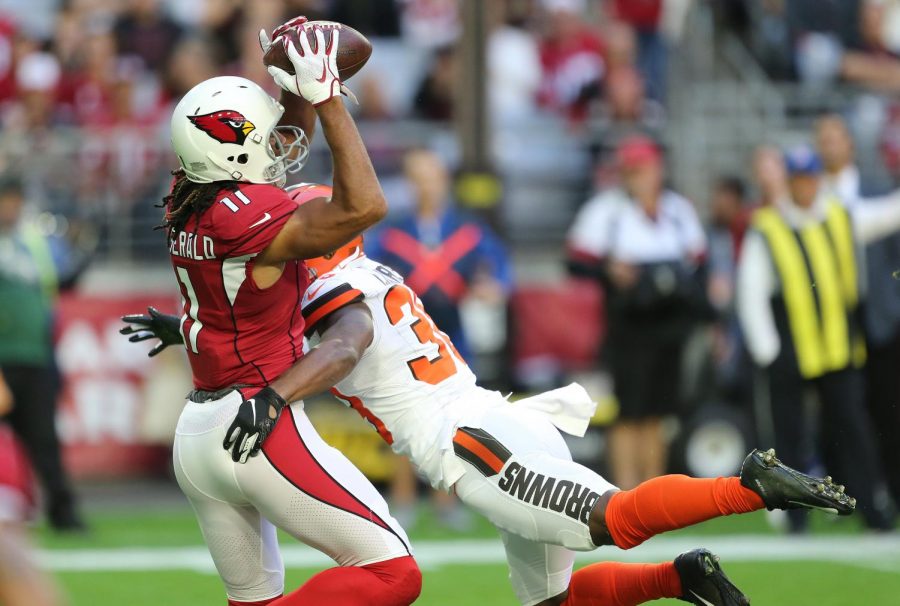Column | History, location make Pitt a football school
Arizona Cardinals wide receiver Larry Fitzgerald hauls in a first-down reception as he is hit by Cleveland Browns defensive back T.J. Carrie in the first quarter, Dec. 15, 2019, at State Farm Stadium.
February 12, 2021
This column is part of a series. To read the column about soccer, click here. To read the column about basketball, click here.
Between the beloved Steelers, one of the most storied franchises in all of sports, and the incredible football talents like Aaron Donald and Tyler Boyd that come out of the area, Pittsburgh is clearly a football town. A football town isn’t complete without a college-level program, which has culminated in Pitt’s identity as a “football school.”
The first season of Pitt football dates all the way back to 1890, when Pitt was known as the Western University of Pennsylvania, making it one of the oldest athletic programs at the University. Over its more than 130-year history, the program has found a lot of success on both team and individual levels. Pitt has racked up nine national championships and also gained wins in big postseason appearances such as the Rose, Fiesta, Sun, Gator and Sugar Bowls.
Players who have thrived at Pitt have gone on to have excellent NFL careers as well. The Panthers have rostered 93 first-team All-American selections, with defensive end Rashad Weaver becoming the most recent selection following his spectacular 2020 performance.
Pitt also ranks among the top schools in producing both college football and NFL Hall of Famers with 19 and nine, respectively. With stars such as Larry Fitzgerald and Donald still active, surefire future Hall of Famers, this number will likely climb in the coming years and make Pitt one of the top three schools in producing NFL Hall of Famers.
With just these numbers alone, the football program makes its claim as the top athletic program at Pitt. With such a long history and so many team and individual achievements, Pitt clearly qualifies as a football school.
One can make the argument that the Pitt football program has not seen the same level of success recently that it had in the past, and there’s truth to this statement. But the same could be said about the basketball program.
Neither has done anything significant in postseason play in more than a decade. The basketball program last reached the Elite Eight in 2009, and has only once reached the Final Four, way back in 1941.
But the football program has the edge because of its history. Football bolsters nine national championships while the basketball program has none. While the football program has garnered attention for producing professional talent, the Panthers don’t possess a prestigious connection to the NBA. Given this difference and a drastically uneven balance in championship contention, Pitt can’t be seen as a basketball school.
Other programs at Pitt, such as soccer and volleyball, have seen quite a bit of success recently, but they do not have the history that the football program has, or even that of the basketball program.
The soccer program began as a club team back in 1951, and eventually gained the status of a varsity team in 1954. The program hasn’t prospered until recently, earning its first NCAA Tournament appearance since 1965 last year.
The volleyball program started even more recently, beginning in 1974. It has found lots of success over the last few years, reaching the tournament every season since 2016 and finding itself ranked for almost the entirety of the last two years. But this success is newfound, not something over a long period of time that has earned Pitt a national reputation.
While both of these programs have started to see a lot of success, they do not have enough history to overtake football, which means Pitt can’t be a volleyball or soccer school.
Pitt football has the most history of any athletic program at the University and has also historically maintained the most successful athletic program at Pitt. The program competes competently every year and continues to bring in top talent, which it then develops into top talent at the professional level.
As long as the Panther football program continues to compete at a high level and continues to produce NFL talent, Pitt will always be a football school.



